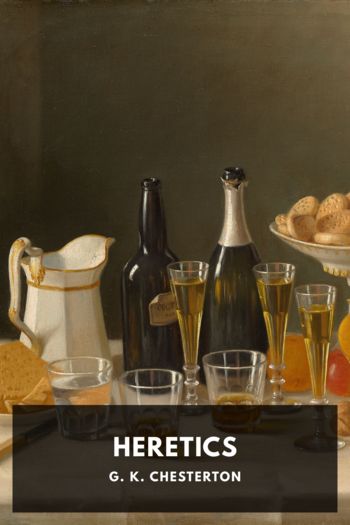Heretics by G. K. Chesterton (best way to read e books TXT) 📕

- Author: G. K. Chesterton
Book online «Heretics by G. K. Chesterton (best way to read e books TXT) 📕». Author G. K. Chesterton
Mr. Hope, however, is a very mild case, and in him there is not only an element of romance, but also a fine element of irony which warns us against taking all this elegance too seriously. Above all, he shows his sense in not making his noblemen so incredibly equipped with impromptu repartee. This habit of insisting on the wit of the wealthier classes is the last and most servile of all the servilities. It is, as I have said, immeasurably more contemptible than the snobbishness of the novelette which describes the nobleman as smiling like an Apollo or riding a mad elephant. These may be exaggerations of beauty and courage, but beauty and courage are the unconscious ideals of aristocrats, even of stupid aristocrats.
The nobleman of the novelette may not be sketched with any very close or conscientious attention to the daily habits of noblemen. But he is something more important than a reality; he is a practical ideal. The gentleman of fiction may not copy the gentleman of real life; but the gentleman of real life is copying the gentleman of fiction. He may not be particularly good-looking, but he would rather be good-looking than anything else; he may not have ridden on a mad elephant, but he rides a pony as far as possible with an air as if he had. And, upon the whole, the upper class not only especially desire these qualities of beauty and courage, but in some degree, at any rate, especially possess them. Thus there is nothing really mean or sycophantic about the popular literature which makes all its marquises seven feet high. It is snobbish, but it is not servile. Its exaggeration is based on an exuberant and honest admiration; its honest admiration is based upon something which is in some degree, at any rate, really there. The English lower classes do not fear the English upper classes in the least; nobody could. They simply and freely and sentimentally worship them. The strength of the aristocracy is not in the aristocracy at all; it is in the slums. It is not in the House of Lords; it is not in the Civil Service; it is not in the Government offices; it is not even in the huge and disproportionate monopoly of the English land. It is in a certain spirit. It is in the fact that when a navvy wishes to praise a man, it comes readily to his tongue to say that he has behaved like a gentleman. From a democratic point of view he might as well say that he had behaved like a viscount. The oligarchic character of the modern English commonwealth does not rest, like many oligarchies, on the cruelty of the rich to the poor. It does not even rest on the kindness of the rich to the poor. It rests on the perennial and unfailing kindness of the poor to the rich.
The snobbishness of bad literature, then, is not servile; but the snobbishness of good literature is servile. The old-fashioned halfpenny romance where the duchesses sparkled with diamonds was not servile; but the new romance where they sparkle with epigrams is servile. For in thus attributing a special and startling degree of intellect and conversational or controversial power to the upper classes, we are attributing something which is not especially their virtue or even especially their aim. We are, in the words of Disraeli (who, being a genius and not a gentleman, has perhaps primarily to answer for the introduction of this method of flattering the gentry), we are performing the essential function of flattery which is flattering the people for the qualities they have not got. Praise may be gigantic and insane without having any quality of flattery so long as it is praise of something that is noticeably in existence. A man may say that a giraffe’s head strikes the stars, or that a whale fills the German Ocean, and still be only in a rather excited state about a favourite animal. But when he begins to congratulate the giraffe on his feathers, and the whale on the elegance of his legs, we find ourselves confronted with that social element which we call flattery. The middle and lower orders of London can sincerely, though not perhaps safely, admire the health and grace of the English aristocracy. And this for the very simple reason that the aristocrats are, upon the whole, more healthy and graceful than the poor. But they cannot honestly admire the wit of the aristocrats. And this for the simple reason that the aristocrats are not more witty than the poor, but a very great deal less so. A man does not hear, as in the





Comments (0)